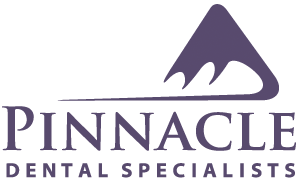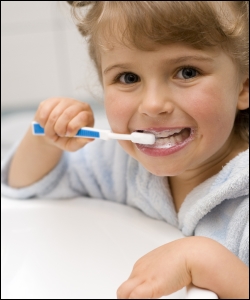
Dental Implants








Primary, or "baby," teeth are important for many reasons. Not only do they help children speak clearly and chew naturally, they also aid in forming a path that permanent teeth can follow when they are ready to erupt.

Pediatric dentists are the pediatricians of dentistry. A pediatric dentist has two to three years specialty training following dental school and limits his/her practice to treating children only. Pediatric dentists are primary and specialty oral care providers for infants and children through adolescence, including those with special health needs. .
In order to prevent dental problems, your child should see a pediatric dentist when the first tooth appears, or no later than his/her first birthday.
A check-up every six months is recommended in order prevent cavities and other dental problems. However, your pediatric dentist can tell you when and how often your child should visit based on their personal oral health.
Parents should take their children to the dentist regularly, beginning with the eruption of the first tooth. Then, the dentist can recommend a specific program of brushing, flossing, and other treatments for parents to supervise and teach to their children. These home treatments, when added to regular dental visits and a balanced diet, will help give your child a lifetime of healthy habits.
There is very little risk in dental X-rays. Pediatric dentists are especially careful to limit the amount of radiation to which children are exposed. Lead aprons and high-speed film are used to ensure safety and minimize the amount of radiation.
Baby teeth begin forming before the newborn is born. The first primary teeth to erupt are the lower central incisors. All 20 primary teeth usually erupt by the age of 3 years; however, the pace and order of eruption of teeth varies among different individuals. Permanent teeth begin appearing around age 6 years, starting with the first molars and the lower central incisors. This process will continue until age 21 years. Adults have 32 permanent teeth including 4 wisdom teeth.
Instructions for Conscious Sedation
Conscious sedation allows patients to relax during a dental procedure. Patients who have received conscious sedation do not experience the side-effects of deep sedation or general anesthesia. The effects of conscious sedation vary in different individuals. Some patients may experience brief periods of sleep, while others stay awake and relaxed. Patients who receive conscious sedation are usually able to speak and respond to verbal cues throughout the procedure, communicating any discomfort they may experience to the doctor or the nurse. A brief period of amnesia may erase any memory of the procedure. The effects of conscious sedation may last a few hours to a day after its administration.
